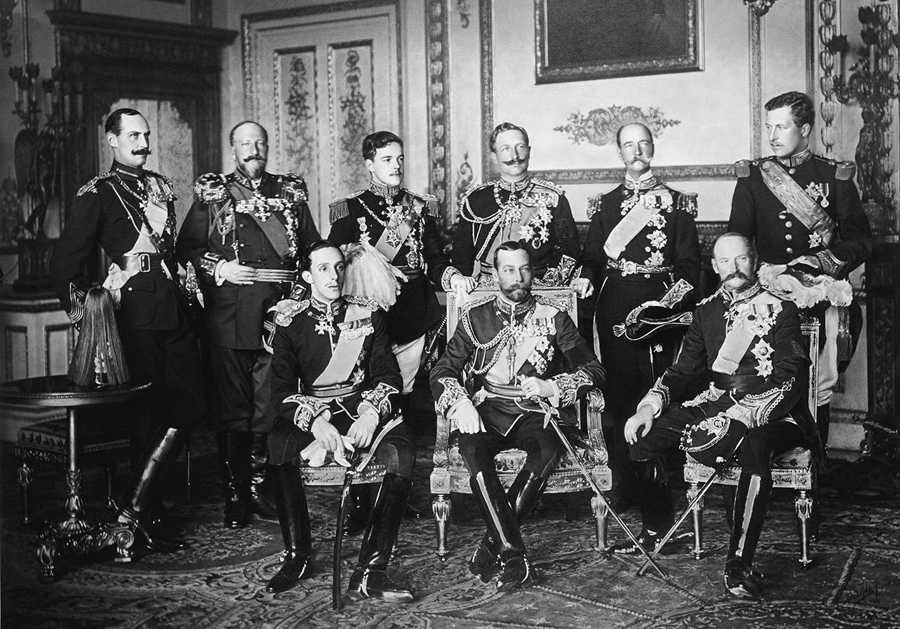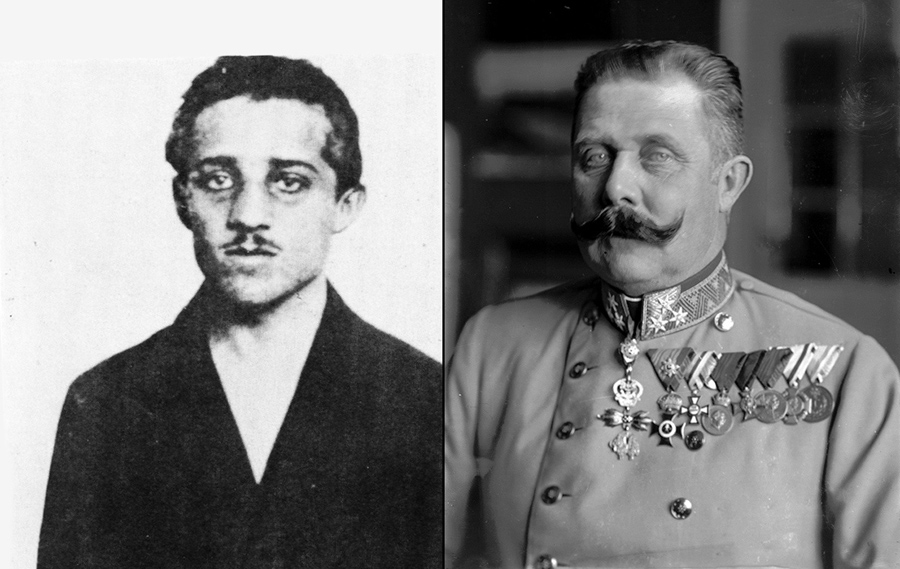https://www.theatlantic.com/projects/world-war-i-in-photos/
World War I in Photos: Introduction
A century ago, an assassin, a Serbian nationalist, killed the heir to the throne of Austria-Hungary as he visited Sarajevo. This act was the catalyst for a massive conflict that lasted four years. More than 65 million soldiers were mobilized by more than 30 nations, with battles taking place around the world. Industrialization brought modern weapons, machinery, and tactics to warfare, vastly increasing the killing power of armies. Battlefield conditions were horrific, typified by the chaotic, cratered hellscape of the Western Front, where soldiers in muddy trenches faced bullets, bombs, gas, bayonet charges, and more. On this 100-year anniversary, I've gathered photographs of the Great War from dozens of collections, some digitized for the first time, to try to tell the story of the conflict, those caught up in it, and how much it affected the world. This entry is part 1 of a 10-part series on World War I. In this installment, I hope to give a glimpse of the war's beginnings, and a preview of what is to come.

- Nine European Sovereigns at Windsor for the funeral of King Edward VII in May of 1910, four years before the war began. Standing, from left to right: King Haakon VII of Norway, Tsar Ferdinand of Bulgaria, King Manuel II of Portugal, Kaiser Wilhelm II of the German Empire, King George I of Greece and King Albert I of Belgium. Seated, from left to right: King Alfonso XIII of Spain, King-Emperor George V of the United Kingdom and King Frederick VIII of Denmark. Within the next decade, Kaiser Wilhelm II and Tsar Ferdinand's empires would engage in bloody warfare with the nations led by King Albert I and King George V. The war was also a family affair, as Kaiser Wilhelm II was a first cousin to King George V, and an uncle to King Albert I. Of the remaining monarchs pictured, over the next decade one would be assassinated (Greece), three would keep their nations neutral (Norway, Spain, and Denmark), and two would be forced out of power by revolutions. #W. & D. Downey
 In 1914, Austria-Hungary was a powerful and huge country, larger than Germany, with nearly as many citizens. It had been ruled by Emperor Franz Joseph I since 1848, who had been grooming his nephew, Archduke Franz Ferdinand as the heir to the throne. In this photo, taken in Sarajevo on June 28, 1914, a visiting Archduke Franz Ferdinand and his wife, Czech Countess Sophie Chotek, are departing a reception at City Hall. Earlier that morning, on the way to the hall, their motorcade had been attacked by one of a group of Serbian nationalist assassins, whose bomb damaged one car and injured dozens of bystanders. After this photo was taken, the Archduke and his wife climbed into the open car, headed for a nearby hospital to visit the wounded. Just blocks away though, the car paused to turn around, directly in front of another assassin, who walked up to the car and fired two shots, killing both Franz Ferdinand and his wife. #AP
In 1914, Austria-Hungary was a powerful and huge country, larger than Germany, with nearly as many citizens. It had been ruled by Emperor Franz Joseph I since 1848, who had been grooming his nephew, Archduke Franz Ferdinand as the heir to the throne. In this photo, taken in Sarajevo on June 28, 1914, a visiting Archduke Franz Ferdinand and his wife, Czech Countess Sophie Chotek, are departing a reception at City Hall. Earlier that morning, on the way to the hall, their motorcade had been attacked by one of a group of Serbian nationalist assassins, whose bomb damaged one car and injured dozens of bystanders. After this photo was taken, the Archduke and his wife climbed into the open car, headed for a nearby hospital to visit the wounded. Just blocks away though, the car paused to turn around, directly in front of another assassin, who walked up to the car and fired two shots, killing both Franz Ferdinand and his wife. #AP Assassin Gavrilo Princip (left) and his victim Archduke Franz Ferdinand, both photographed in 1914. Princip, a 19 year old a Bosnian Serb who killed the Archduke, was recruited along with five others by Danilo Ilic, a friend and fellow Bosnian Serb, who was a member of the Black Hand secret society. Their ultimate goal was the creation of a Serbian nation. The conspiracy, assisted by members of Serbia's military, was quickly uncovered, and the attack became a catalyst that would soon set massive armies marching against each other around the world. All of the assassins were captured and tried. Thirteen received medium-to-short prison sentences, including Princip (who was too young for the death penalty, and received the maximum, a 20 year sentence). Three of the conspirators were executed by hanging. Four years after the assassination, Gavrilo Princip died in prison, brought down by tuberculosis, which was worsened by harsh conditions brought on by the war he helped set in motion. #Osterreichische Nationalbibliothek
Assassin Gavrilo Princip (left) and his victim Archduke Franz Ferdinand, both photographed in 1914. Princip, a 19 year old a Bosnian Serb who killed the Archduke, was recruited along with five others by Danilo Ilic, a friend and fellow Bosnian Serb, who was a member of the Black Hand secret society. Their ultimate goal was the creation of a Serbian nation. The conspiracy, assisted by members of Serbia's military, was quickly uncovered, and the attack became a catalyst that would soon set massive armies marching against each other around the world. All of the assassins were captured and tried. Thirteen received medium-to-short prison sentences, including Princip (who was too young for the death penalty, and received the maximum, a 20 year sentence). Three of the conspirators were executed by hanging. Four years after the assassination, Gavrilo Princip died in prison, brought down by tuberculosis, which was worsened by harsh conditions brought on by the war he helped set in motion. #Osterreichische Nationalbibliothek
- Between 1914 and the war's end in 1918, more than 65 million soldiers were mobilized worldwide - requiring mountains of supplies and gear. Here, on a table set up outside a steel helmet factory in Lubeck, Germany, a display is set up, showing the varying stages of the helmet-making process for Stahlhelms for the Imperial German Army. #National Archives / Official German Photograph

- The Salonica (Macedonian) front, Indian troops at a Gas mask drill. Nationaal Archief
- (CPL Blog editor note: The horrific results of poison gas in warfare have spurred the drafting of various treaties signed since the end of the first world war. Progressive agreements in this area have resulted in the banning of the use of chemical weapons in warfare as well as the production, transportation and stockpiling of these compounds. Sadly this has not brought an end to their use in conflicts. from https://www.theguardian.com/science/blog/2016/sep/16/chlorine-the-gas-of-war-crimes)



























